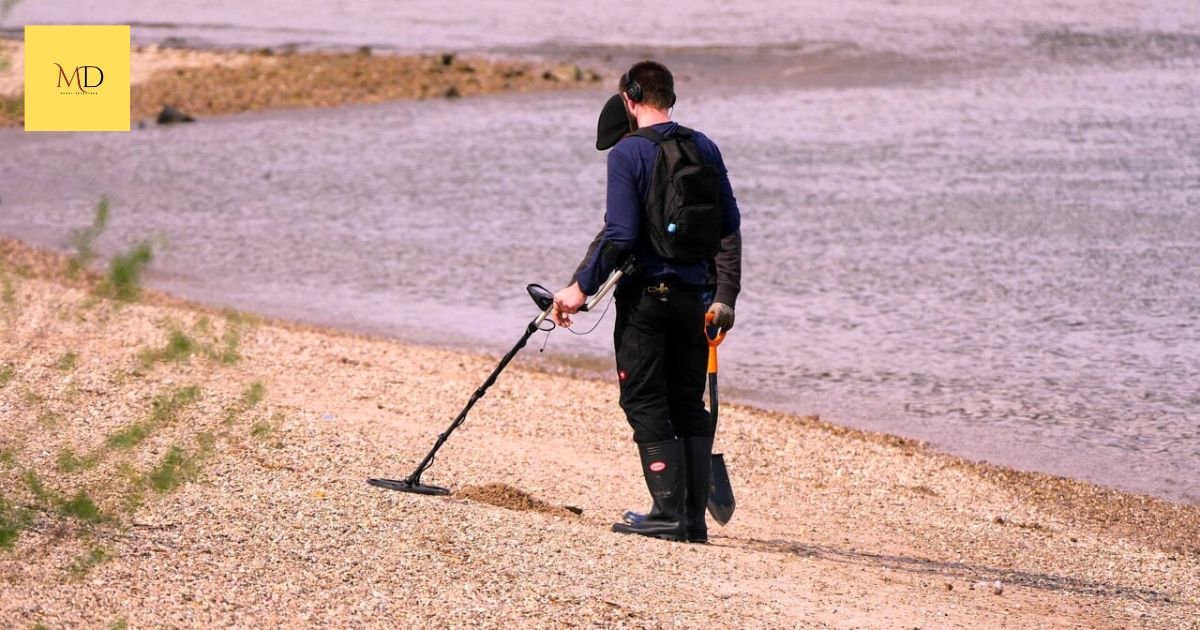A metal detector is a device that detects the presence of metal objects. It emits electromagnetic fields and senses disruptions caused by nearby metals. These detectors are commonly used for security, archaeological, and hobbyist purposes. They help locate coins, relics, and ensure safety by identifying hidden metal items.
Are you ready to embark on a treasure-hunting adventure? Discover hidden treasures and unearth historical artifacts with the right metal detector! If you’re wondering, What to look for in a metal detector, read on for expert guidance that will lead you to your next exciting find. Don’t miss out – start your journey today.
When considering “What to look for in a metal detector,” key factors to consider include your intended use (hobbyist, security, or archaeology), sensitivity to different metals, discrimination capabilities, and user-friendliness. Make sure to choose a detector that suits your needs and experience level for a successful metal-detecting adventure.
Purpose and Budget
When embarking on a journey into the world of metal detecting, it’s essential to define your purpose and establish a budget. Your purpose will determine the type of metal detector that’s best suited for you. Are you interested in treasure hunting as a hobby, searching for relics, or perhaps even getting involved in archaeological exploration? Knowing your purpose will help narrow down the choices and guide you towards the features you need.
Equally important is setting a budget. Metal detectors come in a wide range of prices, from affordable entry-level models to high-end, specialized equipment. By establishing a budget, you ensure that you’re making a well-informed investment without overspending. It’s a crucial step in the process of selecting the right metal detector that aligns with your goals and financial capabilities, making your treasure-hunting experience all the more rewarding.
Detector Types
When it comes to metal detectors, understanding the different types is crucial in finding the one that suits your needs. There are primarily three main types of metal detectors to choose from: VLF (Very Low Frequency), PI (Pulse Induction), and BFO (Beat Frequency Oscillation).
VLF detectors are ideal for beginners as they are versatile and capable of distinguishing between various types of metals. PI detectors, on the other hand, are excellent for deep searching and work well in highly mineralized soil. BFO detectors are the simplest but less precise, making them suitable for casual hobbyists. By choosing the right detector type, you can enhance your metal-detecting experience and increase your chances of finding the treasures you seek.
Sensitivity and Depth
Sensitivity and depth are critical considerations when selecting a metal detector. Sensitivity refers to a detector’s ability to detect small or deeply buried objects. A high sensitivity setting allows the detector to pick up even tiny metal targets, making it suitable for finding small coins or jewelry. However, in highly mineralized soil, this setting can also lead to false signals, so it’s essential to strike a balance. On the other hand, depth capability determines how deep a detector can reach to locate items.
To find the right metal detector for your needs, you must consider both sensitivity and depth carefully. Your choice should align with your specific objectives, whether it’s finding coins in a park, uncovering historical artifacts in remote locations, or simply exploring the thrill of the hunt. Balancing these two factors will help you optimize your metal-detecting experience and increase your chances of making exciting discoveries.
Sensitivity Settings Explained

Sensitivity settings on a metal detector are crucial for fine-tuning your device to perform optimally. This feature determines how deep the detector can penetrate the ground to detect metal objects. When you increase the sensitivity, the detector becomes more responsive and can detect targets at greater depths. However, higher sensitivity settings can also make the detector more prone to false signals from ground minerals and interference, so it’s essential to strike a balance.
Finding the right sensitivity level depends on the specific conditions of your hunting site. In mineralized soil or areas with a lot of metal trash, you may need to lower the sensitivity to reduce interference. On the other hand, in cleaner environments with less interference, you can increase the sensitivity to maximize your chances of finding deeper and smaller targets. Experimenting with sensitivity settings and paying attention to the detector’s feedback will help you find the optimal balance and get the most out of your metal detecting experience.
Setting Your Budget
Setting your budget is a crucial step when considering the purchase of a metal detector. The range of prices for metal detectors can vary significantly, so determining how much you’re willing to invest is essential. Whether you’re a beginner looking for an affordable entry-level model or an experienced enthusiast ready to invest in a high-end detector with advanced features, understanding your budget will help narrow down your options.
Once you’ve established your budget, you can explore detectors within that price range, ensuring that you find a model that meets your needs without breaking the bank. Remember to consider not only the cost of the detector itself but also any potential accessories you may need, such as headphones, digging tools, or protective gear. By carefully setting your budget, you’ll be better prepared to make an informed decision and choose a metal detector that offers the best value for your investment.
Understanding the Different Types
Understanding the Different Types of metal detectors is crucial when you’re looking to purchase the right one for your needs. Metal detectors come in various types, with each offering distinct advantages and disadvantages. The most common types include Very Low Frequency (VLF), Pulse Induction (PI), and Beat Frequency Oscillation (BFO) detectors.
VLF detectors are ideal for general-purpose metal detecting. They’re versatile and can discriminate between different types of metals. On the other hand, PI detectors are excellent for deep-seated objects and are less affected by highly mineralized ground. Lastly, BFO detectors are simpler and often more affordable, making them a great choice for beginners. Each type has its strengths and limitations, so understanding these differences is essential for making an informed decision when selecting a metal detector that aligns with your specific interests and requirements.
FAQ’s
What makes a good quality metal detector?
A good-quality metal detector is characterized by its sensitivity, discrimination capabilities, user-friendliness, and durability.
What kind of metal detector should I get?
The type of metal detector you should get depends on your intended use and budget.
What Cannot be detected by a metal detector?
Metal detectors cannot detect non-metallic objects, such as plastics, wood, glass, or liquids.
Conclusion
Selecting the right metal detector is an essential step for anyone embarking on a journey of discovery, be it treasure hunting, security, or archaeology. With the plethora of options available, it’s crucial to define your purpose, set a budget, and understand the various types of metal detectors. Sensitivity, depth capabilities, discrimination features, search coils, ground balance, and user-friendly controls are all factors that need careful consideration to match your specific needs. The weight, portability, and additional features should also align with your preferences and plans.
Furthermore, conducting thorough research on trusted brands and models, along with taking advantage of user reviews and recommendations, will further aid you in making an informed decision. With the right metal detector in hand, the thrill of discovery awaits. So, start your metal-detecting journey and unlock the mysteries hidden beneath the earth’s surface. Whether you’re a novice or a seasoned enthusiast, the right choice of a metal detector can truly enhance your detecting experience and make it both enjoyable and rewarding.











